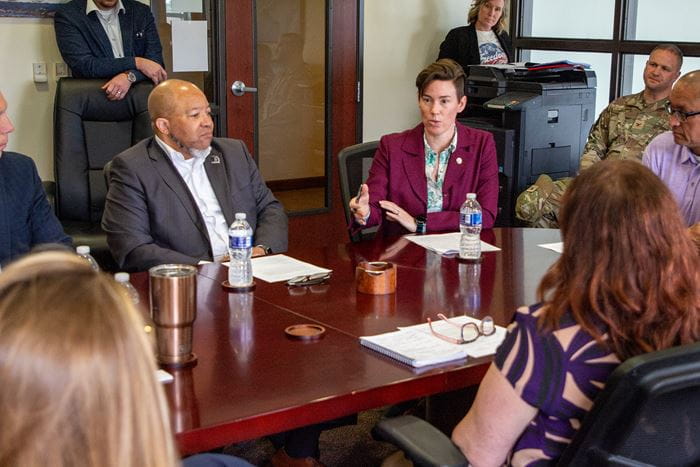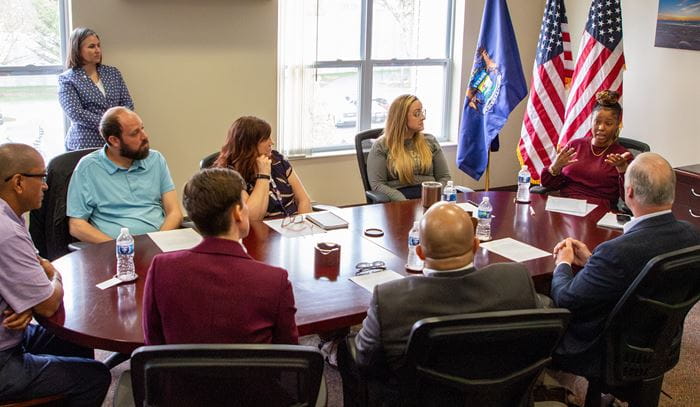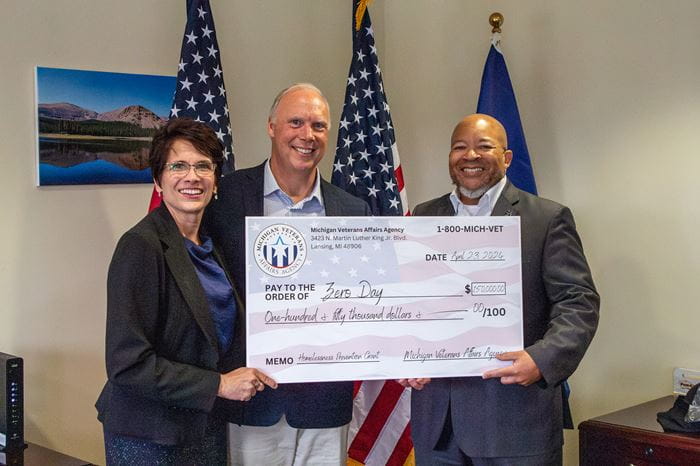The web Browser you are currently using is unsupported, and some features of this site may not work as intended. Please update to a modern browser such as Chrome, Firefox or Edge to experience all features Michigan.gov has to offer.
MVAA hosts roundtable discussion in Battle Creek to discuss veterans experiencing homelessness
April 25, 2024

On Tuesday, April 23, Michigan Veterans Affairs Agency (MVAA) Director Brian L. Love went on the road to tout Gov. Whitmer’s proposed budget for Fiscal Year 2025 in Battle Creek and discuss the Michigan Veteran Homelessness Prevention Grant program and the challenges facing veterans in the area. Zero Day, a nonprofit organization that supports veterans and their families, hosted the discussion at their Silver Star Veteran Community in Battle Creek with 175 apartments for veterans.
Several experienced voices joined the roundtable to share their unique perspectives and the hurdles facing homeless veterans, including:
• Brian L. Love, MVAA director
• Erika Hoover, MVAA mental health and suicide prevention manager
• Tim Hunnicutt, Zero Day co-founder and chief executive officer
• Michele Pascoe, Summit Pointe veteran navigator
• Juan Gonzalez, Integrated Services of Kalamazoo veteran navigator
• Julia Murray, Volunteers of America supportive services for veteran families coordinator
• Mitch Hough, The Haven VIP case manager and Homeless Management Information System
• Centhia Fleming, U.S. Department of Veterans Affairs Battle Creek outreach worker
• Col. Dan Guy, Michigan Air National Guard 110th wing deputy commander
• LTC Peter Newman, Michigan Army National Guard, commander 507th engineer battalion
• Summer Robertson, Barry County Community Mental Health Authority veteran navigator
• Shelley Doezema, Renewed Communities president
• Nate Cropsey, Zero Day director of veteran support programs

The conversation kicked off by discussing the current trends and patterns in veterans experiencing homelessness in Battle Creek and the surrounding counties. This led the discussion to talking about available housing for women veterans and their children, the challenges in finding housing for those previously evicted, with pets, with a criminal record, and/or with limited or no transportation. Another factor to veteran homelessness is that many veterans don’t have a strong support network. For older veterans, their families and spouses have passed making it difficult for them to take care of themselves. For younger veterans, the community partners have seen a trend in isolation making it difficult for them to build a trusted support network.
To conclude the roundtable discussion, Director Love presented Zero Day’s Co-Founder and CEO, Tim Hunnicutt with a check for $150,000 from the Michigan Veteran Homelessness Prevention Grant program. Zero Day is putting the grant funding to use by purchasing a home in Battle Creek and materials such as siding, roofing, carpet and appliances. Veterans will be hired to renovate, upgrade and maintain the property. Once the house is complete, Zero Day will welcome a female veteran and her children to live in the home with an option for future purchase.

In Fiscal Year 2024, Michigan’s Legislature allocated $2 million dollars to the Michigan Veteran Homelessness Prevention Grant program to assist nonprofit organizations around the state to help veterans facing homelessness. Gov. Whitmer has proposed another $1.5 million to the MVAA’s veteran homelessness prevention grant in her Fiscal Year 2025 budget (page B-69) currently working through the Michigan legislature.
These grants are helping 13 organizations with a variety of initiatives intended to assist homeless veterans and their families. These efforts include creating homes out of shipping containers in Wayne County, renovating a 19-room homeless shelter in Flint and creating a four-unit transitional housing complex in the Upper Peninsula.
Other nonprofits receiving Michigan Veteran Homelessness Prevention Grant funding are:
• 2Marines will fund phase 2 of its shipping container home initiative in Wayne County. Shipping homes are a cost-efficient and innovative approach of repurposing shipping containers into homes. Grant funding will also go toward five rental homes Washtenaw County that are tailored to the needs of veterans for transitional housing, job readiness and family support.
• Center for Higher Educational Achievement in Flint will fund the Homes for Heroes housing program, which offers stable housing and wraparound services such as mental health resources, employment assistance and legal counseling. Grant funding will be used for home renovations.
• Chelsea Hospital will use the grant for its RAVEL program, or Resources for Assisting Veterans-Emergency and Long-term, which aims to expand social services to veterans and their families.
• The Community Action Agency, which serves Jackson, Lenawee and Hillsdale counties, will provide immediate relief, support services and emergency shelter in the form of hotel rooms for homeless veterans.
• Habitat for Humanity of Lapeer-Tuscola will renovate a home for one veteran family.
• Homes for Heroic Forgotten Veterans will buy an apartment building in Warren and make renovations to address the housing and supportive service needs for female veterans and their families.
• Lenawee Emergency and Affordable Housing Corp. will renovate its eight-room Reconnecting Home, a peer-run program for veterans in need of temporary housing.
• My Brother’s Keeper of Genessee County will open the Rolling Hills Veterans Facility in Atlas Township, which will provide transitional housing for up to 10 homeless veterans.
• Peckham Vocational Industries Inc. will fund various support services to prevent veteran homelessness, including emergency shelter, food cards, security deposits, mortgage and rent payments.
• Project Brotherhood Resolve will use the grant for a down payment on a transitional home in Lapeer, as well as closing costs, updates to the home and four months of mortgage payments on the home. Remaining funds will provide veterans with mortgage or rent assistance.
• Renewed Communities will buy and renovate a residence in Battle Creek to house veterans and their families, and then work with them to remove barriers to create optimal well-being and self-sufficiency.
• Soldier Salvation will establish a four-unit veteran transitional complex for Houghton and Keweenaw counties in the U.P. The grant will fund six phases of the project, including deed recording, ownership transfer, electrical upgrades, building upgrades, appliances, etc.